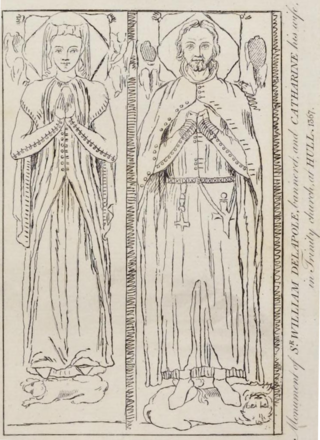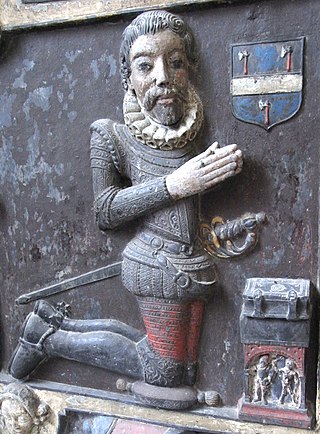Related Research Articles

William Hastings, 1st Baron Hastings KG was an English nobleman. A loyal follower of the House of York during the Wars of the Roses, he became a close friend and one of the most important courtiers of King Edward IV, whom he served as Lord Chamberlain. At the time of Edward's death he was one of the most powerful and richest men in England. He was executed following accusations of treason by Edward's brother and ultimate successor, Richard III. The date of his death is disputed; early histories give 13 June, which is the traditional date.

Alton is a market town and civil parish in East Hampshire, England, near the source of the northern branch of the River Wey. It had a population of 17,816 at the 2011 census.

Sir Thomas de Hungerford of Farleigh Castle in Somerset, was the first person to be recorded in the rolls of the Parliament of England as holding the office of Speaker of the House of Commons of England, although that office had existed before his tenure.

Robert V de Brus, 5th Lord of Annandale, was a feudal lord, justice and constable of Scotland and England, a regent of Scotland, and a competitor for the Scottish throne in 1290/92 in the Great Cause. He is commonly known as "Robert the Competitor". His grandson Robert the Bruce eventually became King of Scots.

Robert de Holland, 1st Baron Holand was an English nobleman, born in Lancashire.

Sir John Knyvet was an English lawyer and administrator. He was Chief Justice of the King's Bench from 1365 to 1372, and Lord Chancellor of England from 1372 to 1377.

Sir Hugh de Courtenay, 2nd/10th Earl of Devon, 2nd Baron Courtenay, feudal baron of Okehampton and feudal baron of Plympton, played an important role in the Hundred Years War in the service of King Edward III. His chief seats were Tiverton Castle and Okehampton Castle in Devon. The ordinal number given to the early Courtenay Earls of Devon depends on whether the earldom is deemed a new creation by the letters patent granted 22 February 1334/5 or whether it is deemed a restitution of the old dignity of the de Redvers family. Authorities differ in their opinions, and thus alternative ordinal numbers exist, given here.
John (II) de Mowbray, 3rd Baron Mowbray was the only son of John de Mowbray, 2nd Baron Mowbray, by his first wife, Aline de Brewes, daughter of William de Braose, 2nd Baron Braose. He was born in Hovingham, Yorkshire.

Sir William de la Pole was a wealthy wool merchant from Kingston upon Hull in Yorkshire, England, who became a royal moneylender and briefly served as Chief Baron of the Exchequer. He founded the de la Pole family, Earls of Lincoln, Earls of Suffolk and Dukes of Suffolk, which by his mercantile and financial prowess he raised from relative obscurity to one of the primary families of the realm in a single generation. At the end of the 14th century he was described in the 'Chronicle of Melsa' as "second to no other merchant of England". He was the founder of the Charterhouse Monastery, Kingston upon Hull.

Shalden is a village and civil parish in the East Hampshire district of Hampshire, England. It is 2.3 miles (3.7 km) northwest of Alton and 1.9 miles (3.1 km) northeast of Bentworth, just off the A339 road. The parish covers an area of 1,536 acres (622 ha) and has an average elevation of 600 feet (180 m) above sea level. The nearest railway station is Alton, 2.5 miles (4.0 km) southeast of the village. According to the 2011 census, it had a population of 435.

East Worldham is a village and former civil parish, now in the parish of Worldham, in the East Hampshire district of Hampshire, England. It is 1.9 miles (3.1 km) east of Alton; and 1.9 miles (3.1 km) south-west of Wyck. Hartley Mauditt and West Worldham are nearby, which, along with East Worldham, form the parish of Worldham. The village is just east of the A31 road and contains St Mary's Church and the Three Horse Shoes pub, amongst other buildings. Worldham Golf Course located just to west and Dean Farm Golf Course just to the east. For centuries the village and surrounding parish were owned by Winchester College. In 1931 the parish had a population of 208.

Hugh de Courtenay, 1st/9th Earl of Devon of Tiverton Castle, Okehampton Castle, Plympton Castle and Colcombe Castle, all in Devon, feudal baron of Okehampton and feudal baron of Plympton, was an English nobleman. In 1335, forty-one years after the death of his second cousin once-removed Isabel de Redvers, suo jure 8th Countess of Devon he was officially declared Earl of Devon, although whether as a new creation or in succession to her is unknown, thus alternative ordinal numbers exist for this Courtenay earldom.

The de Birmingham family held the lordship of the manor of Birmingham in England for four hundred years and managed its growth from a small village into a thriving market town. They also assisted in the invasion of Ireland and were rewarded with the Barony of Athenry. They were stripped of most of their lands in England by the notorious John Dudley, Duke of Northumberland, who held sway over the young King Edward VI (1547–1553).

Sir William Fortescue of Buckland Filleigh, Devon, was a British judge and Master of the Rolls 1741–1749.

Robert Hungerford, 3rd Baron Hungerford was an English nobleman. He supported the Lancastrian cause in the War of the Roses. In the late 1440s and early 1450s he was a member of successive parliaments. He was a prisoner of the French for much of the 1450s until his mother arranged a payment of a 7,966l ransom. In 1461, after defeat on the Towton battlefield on 29 March, he fled with Henry VI to Scotland. In 1461 he was attainted in Edward IV's first parliament, and executed in Newcastle soon after he was captured at the Battle of Hexham.
Sir Adam de Gordon (1273–1333), lord of Gordon, was a Scottish statesman and soldier.

Sir Neil Loring, KG (also "Neel", "Nele", "Nigel", "Loryng", "Loringe"; Latin: Nigellus; was a medieval English soldier and diplomat and a founding member of the Order of the Garter, established by King Edward III in 1348. The central character in two historical novels by Sir Arthur Conan Doyle, Sir Nigel and The White Company, is loosely based on Neil Loring.
Sir Edmund Mortimer was the eldest son of Roger Mortimer, 1st Earl of March, and Joan de Geneville, 2nd Baroness Geneville. By his wife Elizabeth de Badlesmere he was the father of Roger Mortimer, 2nd Earl of March. Though Edmund survived his father by one year, he did not inherit his father's lands and titles as they were forfeited to the Crown and his son only reacquired them gradually.

John Wrey of North Russell, Sourton, and Bridestowe in Devon and Trebeigh, St Ive, Cornwall, was Sheriff of Cornwall in 1587.

Roger Wyck of Bindon in the parish of Axmouth in Devon, was a Member of Parliament for Plympton Erle in 1413.
References
- Foss (1851). The judges of England. Vol. 3. London. pp. 97–9.
{{cite book}}: CS1 maint: location missing publisher (link)
- Attribution
 This article incorporates text from a publication now in the public domain : Kingsford, Charles Lethbridge (1890). "Gurdon, Adam de". In Stephen, Leslie; Lee, Sidney (eds.). Dictionary of National Biography . Vol. 23. London: Smith, Elder & Co. p. 353. lists sources as:
This article incorporates text from a publication now in the public domain : Kingsford, Charles Lethbridge (1890). "Gurdon, Adam de". In Stephen, Leslie; Lee, Sidney (eds.). Dictionary of National Biography . Vol. 23. London: Smith, Elder & Co. p. 353. lists sources as: - Dunstable Annals and Wykes's Chronicle in Annales Monastici, vol. iii. and iv.;
- Rishanger's Chronicle (all in Rolls Series);
- Trivet's Annals Eng. Hist. Soc.;
- Foss's Judges of England, p. 318.]